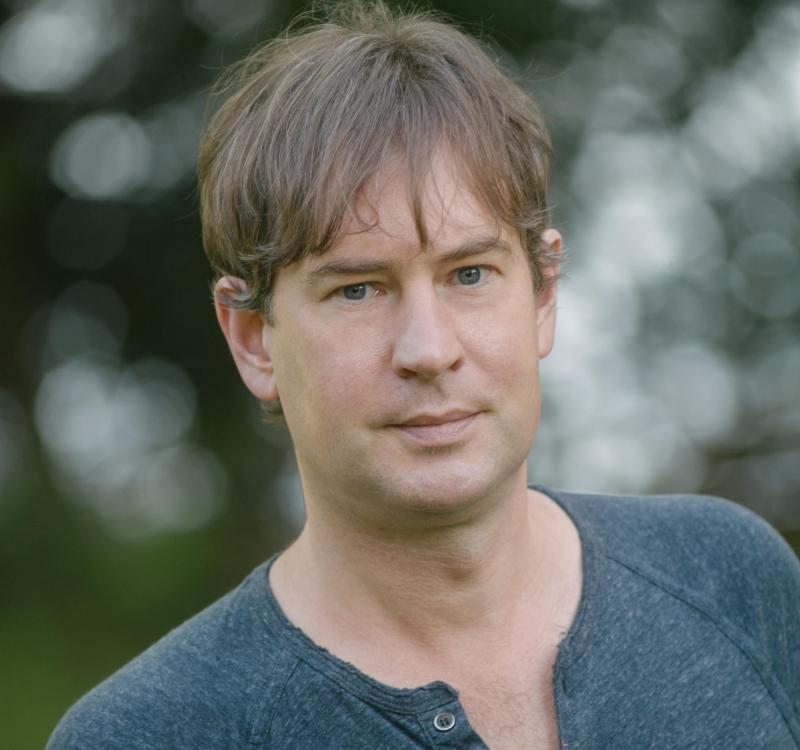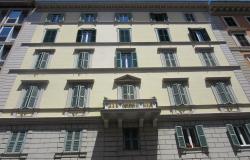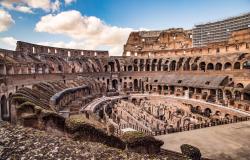For our author interviews series, we’re delighted to present Taras Grescoe, a Canadian journal-ist based in Montreal and the author of seven non-fiction books, the latest being “Possess the Air – Love, Heroism, and the Battle for the Soul of Mussolini’s Rome.” As the subtitle suggests, the book is set in 1920s and ‘30s Rome, during Mussolini’s rise to power and the establishment of Fascism. It tells the story of Lauro de Bosis, an Italian-American poet and aviator, who defied Mussolini’s politics – in the air.
In this compelling interview, Grescoe tells us about his connection to Italy, why he was inspired to write this story, why there are reasons to be concerned about the rise at parallelisms there are with the rise of populisms and xenophobia, and what his characters can teach us about political activism.
Could you give us a little background on your writing, and your connection to Italy?
I tend to think of myself as a writer who travels, rather than a travel writer. I’m fascinated by capturing and evoking a sense of place in my writing, and have a penchant for falling in love with places—cities in particular—and trying to bring them to life for readers.
I first visited Italy as a teenager. I was supposed to take an “educational cruise” around the Med, but our ship was commandeered as a troop transport for the Falklands War, and our class ended up going on a bus tour, much of it in Italy. I fell in love with the place immediately—in spirit and attitude, it seemed very old, very sophisticated, as far away as I could get from my home in British Columbia, which, in terms of European settlement, is one of the youngest places in the world. (I remember haggling for a switchblade with street vendors in Venice, and flirt-ing with Italian girls from the balcony of a hotel room outside Milan; they took our addresses and ended up being enthusiastic pen pals; every letter they mailed was sealed with a kiss.)
I’ve been back to Italy a dozen times. We brought our oldest son Desmond to Tuscany when he was four months old, and then to Rome for several weeks when he was four, and more able to appreciate gelato, cacio e pepe, and the playgrounds of Trastevere.
I happen to be of Ukrainian and Scots-Irish background, but I always seem to gravitate to Italian communities wherever I go. In Montreal, which is home to almost 300,000 people of Italian de-scent, I go to the Club Social in Mile-End where I’ve been taking my morning macchiato for the last twenty years. The Lucifero family, who run the cafe, is partly responsible for my fluency with Calabrese swear words.

How did you become interested in this specific story? Why did you feel the urge to tell it?
In my previous book, "Shanghai Grand," I told the story of Shanghai in the 1930s, through the eyes of Emily Hahn, a New Yorker writer who was witness to the glory days of the “Paris of the Orient.” I find that era—the 1920s and 1930s—fascinating, a real pivotal moment in modern history, when such ideologies as Communism, Fascism, colonialism, capitalism and Socialism were jostling for the leading role on the world stage. I wanted to do the same for Rome as I’d done for Shanghai—bring a lost city, the Rome of a century ago, back to life.
In my visits to Rome over the years, I became intrigued by how the past lived on in the city—the way Augustan Rome cohabits with the medieval, Renaissance, Baroque, and Risorgimento city. And it was striking to me how much of Fascist Rome lived on. Mussolini had twenty years to rebuild the city in his image, and—much more so in Berlin, which has stripped itself of the Nazi past—so much of the Ventennio, the two decades of Fascist rule, lingers on in the contemporary cityscape.
My research initially focused on the American Academy in Rome. I figured all the young expat-riates who attended the Academy would be eyewitnesses to the rise of Fascism. Some of them were, but I was soon sidetracked by Lauro de Bosis, a brilliant Italian-American poet. He had a foot in the expatriate community whose social life often focused on the Academy—he knew Thornton Wilder, Sinclair Lewis, the husband-and-wife journalist team Edgar and Lilian Mow-rer—and another foot in the upper echelons of Roman society through his father, who was the leading Italian translator of Shelley.
Lauro proved to be the perfect conduit into this lost time: not only an eyewitness to how Italy was changing under Fascism, but an actor in it, as a daring challenger to Mussolini’s power.
What were the most surprising aspects of this story that you discovered during your research for the book?
I spent several weeks doing research in the Archivio Centrale dello Stato in EUR, and one of the things that struck me the most was the extent to which the Fascist state kept tabs on every as-pect of the lives of its citizens, both in Italy and abroad. Under Mussolini, Italy became a nation of spies and informers. It’s all documented in the copious files kept on miles of shelves in the state archives. (Many of the documents I saw were initialled with a stylized capital “M,” an indication that Il Duce himself had personally read them.) Seeing the sheer mass of information reported, collected, and filed away on the most mundane movements of everyday citizens made me feel the weight of totalitarianism—how the state demanded total access to the lives of its citizens, and expected total devotion from them.
How did you come up with the title and can you explain our readers what it refers to?
It’s a line from Ovid’s Daedalus and Icarus. The tyrant Minos has imprisoned Icarus and his fa-ther, the brilliant Athenian inventor Daedalus. As they plot their escape, Icarus points out that “Minos may possess everything, but he does not possess the air.” Icarus, of course, comes close to escaping on wax wings, invented by Daedalus, but flies too close to the sun and plunges into the sea.
Lauro wrote his own version of the story of Icarus, a verse play called Icaro. He was always fas-cinated by flight—he’d been sketching winged horses in the margins of his books since he was a schoolboy. When he finally decided to take action against the Fascists—whose rise he’d at first watched with detachment—his heroic gesture of resistance took the form of a night flight over Rome. For him, Mussolini’s totalitarianism, like Minos’s tyranny, aspired to possess every-thing—every aspect of the life of its citizens.
Lauro knew that Mussolini’s actual hold on power was shaky, and based on bluff. Which is why his flight over Rome on October 3, 1931, was such a brilliant gesture—in one simple, dramatic, and heroic act, he showed that the Fascists couldn’t control the airspace over Rome. Nor, Lauro gambled, could they truly lay claim to the hearts and minds of the people of Italy.
Fascism, populism, xenophobia are highly controversial issues right now, in Italy and around the world. Many political commentators, intellectuals and part of the media in Italy claim that there is currently a tendency toward fascist attitudes and there are reasons to be worried. Do you agree with this position? Why or why not?
After the First World War, Italians were disgusted with the ruling class, the Liberals who had controlled political life since the unification of the nation in the nineteenth-century. They saw Liberal politicians as ineffectual and out-of-touch, and rightly blamed them for drawing them into a ruinous war. (The Liberals had done much for the nation, it’s important to note, but by the 1920s they had grown complacent and corrupt.) The Fascists, though no less war-mongering, were seen as being young, energetic, and future-oriented—and their exploits and ambitions were celebrated by poets such as Gabriele d’Annunzio and Futurists like Marinetti.
In the half dozen times I’ve been to Italy in the last decade, I’ve definitely seen a rise in xeno-phobic, and sometimes even Fascist, rhetoric. CasaPound, Salvini, the Lega Nord—their suspi-cion of outsiders, glorification of the Patria, and not-so-subtle nods of approval to violence and thuggery would have been more than familiar to Italians who lived a century ago.
On a global level, we have Trump who wants to MAGA—just as Mussolini wanted to Make Italy Great Again after her “mutilated victory” in the First World War, in which she was seen as hav-ing been short-changed in the spoils of war by the other Allied powers. The past Mussolini wanted to revive, in Rome and the rest of the country, was the glory days of the Roman Empire under Augustus. (Trump, in contrast, seems to be channeling a longing for a return to 1950s-vintage America.) Would-be authoritarians always draw on the frustrations of citizens, and their longing for past—and usually illusory—golden age which can be returned to if they put their trust in a strongman.
We’re living at a time when the generation that experienced tyranny, and in many cases fought to overthrow it, is dying off. This is particularly dangerous in Italy, where some of the most po-tent symbols of Fascism linger on—I’m thinking of the obelisk dedicated to Mussolini in the Foro Italico in Rome, Mussolini’s mausoleum in Predappio, but there are many others—and were never removed from the national landscape. We’re also living in a time when we seem to be forgetting history—when the study of history is being forsaken for the instant gratification we find in smartphones and social media. I believe history can be fascinating, engaging, compel-ling, which is why I constructed this book to be read like a novel.
I wrote "Possess the Air" to remind people that, at a time when ignorance and brutality were on the rise, people of conscience like Lauro de Bosis found the courage to put their lives on the line to denounce the evil. The past, as the scholar of authoritarianism Timothy Snyder has written, doesn’t repeat, but it does instruct—and we’ve got a lot to learn from what happened in Italy a hundred years ago.
In what aspects does the Rome you describe in the book differ from the Rome of today? What are the most drastic changes? You write in your book, “To many Italians, the city was a shame-ful symbol of national decline.” This refers to the early 1900s, but it’s a sentence that could very well be written today.
I think Rome’s relationship with the rest of Italy has been a difficult one for a long time. Com-pared to Turin and Milan, it’s not really a productive, industrial city—yet it remains a centre of power, for the Church and the national government.
I try to delve into the sources of this conflicted relationship in the book. At its apogee under the Roman Empire, the city became Caput Mundi, the capital of the world, with a population of 1.4 million. By the sixteenth century, the population had shrunk to 25,000. The city the German and British Romantics loved in the nineteenth century was a beautiful backwater, where sheep grazed among the ruins of the Forum. The Liberals made Rome a capital again, but in spite of their attempts to modernize—bringing in streetlights, sanitation, taking measures to limit the damage brought on by the flooding of the Tiber—it remained backwards compared to London, Berlin, and Paris. Mussolini and the Fascists focused on building new roads and triumphal routes, and “liberating” the imperial monuments they approved of, often at the expense of poor residents who were relocated from their demolished homes to makeshift hovels far from the centre of the city.
Rome, though the population of the comune is now 2.9 million—far bigger than its maximum under the Romans—remains a dysfunctional city. The transportation system in particular is a mess (though admittedly, it’s hard to make progress on digging new metro lines in such an ar-cheological treasure trove) and corruption is a big problem.
For outsiders, going back to the Romantics, the charm of Rome has always been identified with this paradox: though it’s a big city, it functions more like a collection of villages. That can indeed be charming if you’re visiting, but when you’re trying to educate your children, do business, get around town, take care of aged parents, and deal with the bureaucracy, it can be more infuriating than anything else.
What do you admire the most in the three main characters you portray? What can they teach us about political activism?
Possess the Air is a case study in how intellectuals, and people of conscience, dealt with the rise of authoritarianism. Some, like the American poet Ezra Pound, the sculptor Nancy Cox McCor-mack or the Sicilian playwright Luigi Pirandello, embraced Fascism, seeing it as the symbol of all that was modern and forward-thinking.
I most admired the clear-eyed people who observed what Fascism meant in practice: political opponents being beaten or forced to choke down castor oil, the murder of Socialists, internal exile for tens of thousands of citizens. For me, Lauro de Bosis was a perfect example. Recognizing that Italian political life had become sclerotic under the Liberals, he gave Fascism the benefit of the doubt in its early years, even giving a lecture tour in Canada and the United States that offered praise for Mussolini. When it became clear just how violent and oppressive the Fascists really were, he repented, and devoted his life—and sacrificed his relationship with his lover, the brilliant monologuist Ruth Draper—to finding a way to symbolically humiliate the regime. Lauro recognized that the nineteenth-century version of Liberalism had been discredited, but he dreamed of a reinvigorated Liberalism—to renew with what writer Adam Gopnik has called the “Thousand Small Sanities” that are the essence of Liberalism—the incrementalism that, while not glamorous or dramatic, is the real engine of social progress.
Lauro’s friends, the Italian-Canadian archeologist Gilbert Bagnani and his wife Mary Augusta Stewart Houston represented a different response: an intellectual resistance to the regime. They refused to participate in the Fascists’ efforts to lionize Augustan Rome, focusing their ef-forts on Egyptian antiquity—much to the chagrin of Mussolini and his henchmen.
Are you currently working on a new book?
I am! I was just visiting the Roman ruins of Baelo Claudia, east of Cádiz in Spain, as part of the research. The subject is the archeology of taste, and how attempts to revive lost and forgotten foods are offering hope for the future of food in a time of diminishing biodiversity.
You can buy Taras Grescoe's "Possess the Air" here.











